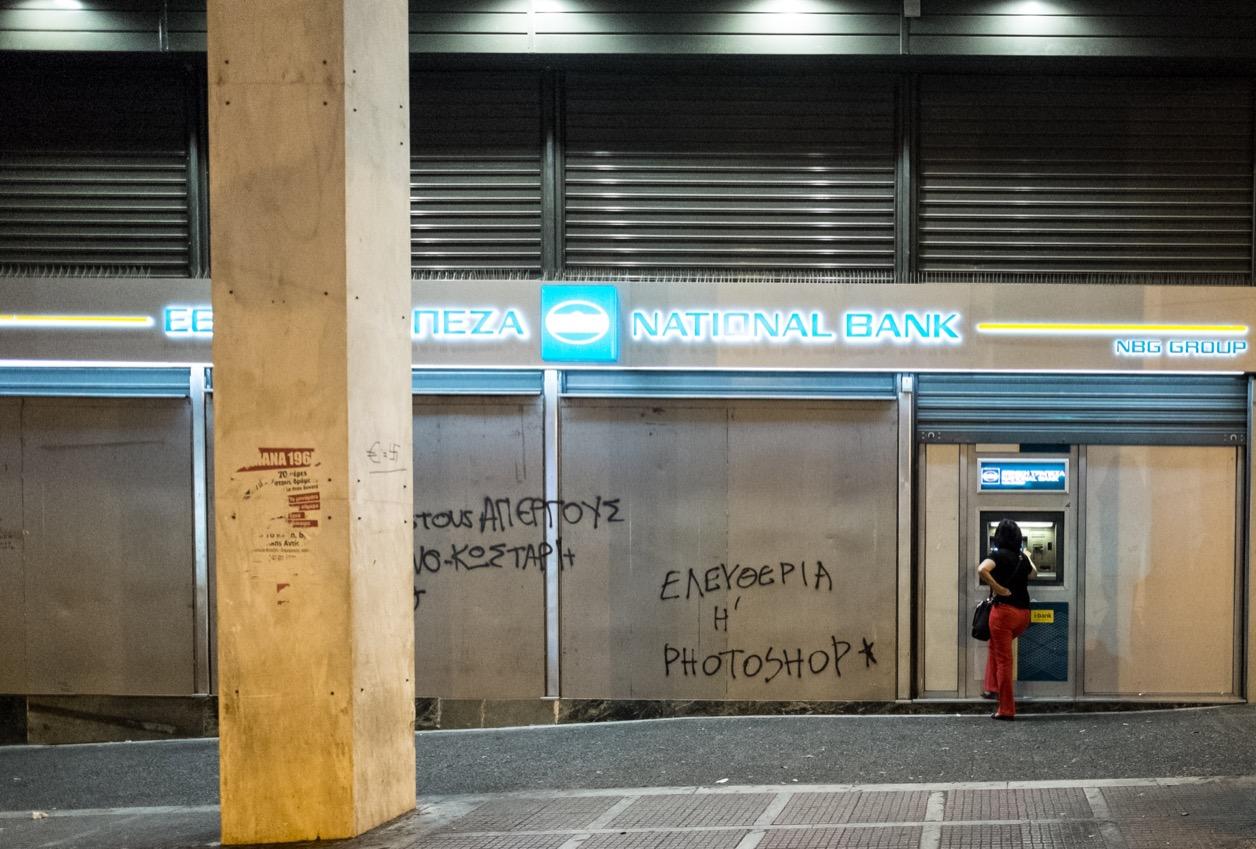The debt crisis is destroying Greece’s fledgling startup industry
Many of Greece's banks are closed, ATM transactions limited, and money transfers out of the country banned.
Update: Greece reached a bailout deal with euro zone leaders on Monday after overnight talks. But Greek banks remain closed.
ATHENS — John Chasoulidis worries and worries these days.
He’s the 28-year-old founder of Flipped Horizons, an indie game development company in Athens. Its web hosting service, and a bunch of other crucial things, need to be paid for abroad.
But since money can’t actually be sent overseas, that’s not possible.
"Now everybody is worried, and put their dreams and ambitions for their companies on hold," he says, referring to fellow Greek entrepreneurs. "[We] are in a pause mode until everything cools off a bit."
Greece’s bank closures and cash restrictions are hurting companies locally and internationally, and many are concerned about what’s to come after Sunday’s massive public rejection of an economic bailout deal. Prime Minister Alexis Tsipras had until the end of Thursday to come up with new proposals. The European Union’s other very frustrated leaders are expected to decide what to do about it this weekend.
There’s uncertainty all over — the only thing sure is everybody wants their money and they can’t get it.
Last week, strict limits on ATM withdrawals, and a ban on money transfers abroad, took effect to prevent panicked Greeks from gutting their accounts all at once. Officials say the banks aren't likely to reopen this week. And the European Central Bank is refusing to increase credit for Greek banks.
Ordinary people are struggling to pay their bills and buy the basics. But these capital controls are also affecting businesses: They can't perform simple operations like wiring money abroad, ordering raw materials, or cashing checks since the banks are closed.
“This creates a situation where a cash flow shortage is approaching fast," says Miltiadis Gkouzouris, a business consultant in Athens. “Direct effects of a shortfall in cash flow are not paying salaries of the employees, shutting down certain production lines and operations, and not being able to deliver goods or services to customers.”
In Luxembourg, some restaurants may face shortages of pita bread, and in Germany, purveyors of Greek food fret over feta. Traders seem like they’re about to freak out.
“Today for example, we were supposed to receive Greek pita bread," says Aristotelis Karvelas, president of the Luxembourg-based Association of Overseas Greek Food and Drinks Importers. They usually supply more than 5,500 restaurants worldwide every day. Only now, they can hardly operate.
"The producer can't receive raw material, they're stuck at customs," he adds. “Imagine that in many cases, we import even the palettes — we don’t even have palettes to put the products on to send them abroad.”
And small startups that feed off business across borders are really feeling the pain. Greece’s startup scene was just starting to flourish after the crisis hit in 2008. Now it’s taking a hit from the money restrictions.
“The first obvious problems for us with capital controls were payment and subscription renewals," says Chasoulidis, whose company is often hired on projects by Porsche, Siemens, Pepsi and Vodafone — all international companies headquartered outside of Greece.
“We can’t pay for our web-hosting, our licenses for the game engine Unity we’re using, and no one has given us a clear answer on when or how we can do that,” he says.
“We can’t pay our partners either, we can’t move money [abroad] and we saw that Paysafe cards — one of the ways that games are paid in our country — were not working either.”
He says investors have had doubts since the turmoil began earlier this year, following months of back and forth negotiations between the Greek government and creditors. Prices were cut, project ambitions curtailed and clients began having second thoughts about investing — unlike last year — in games, mobile apps and websites that usually sold easily.
Meanwhile, help is already on the way.
Panos Papadopoulos and Jon Vlachogiannis, two Greek entrepreneurs in America’s Silicon Valley, are so upset seeing friends at home having trouble running their startups, they took action: They set up www.zerofund.org, to help Greek companies pay for internet domains hosted on foreign servers, since Greek credit cards are being refused by many companies outside of Greece.
“[Greek startups] could pretty much vanish,” says Papadopoulos, 32. “Most of the services bought are provided by mostly US vendors, companies like Amazon, MailChimp, Google Apps. If you cannot pay for them, you are shut down even though you may have a healthy business, you will cease to exist. It's really worrisome.”
Recognizing the predicament, one US internet company is granting auto-renewal subscriptions in Greece.
"A website and digital presence is not just a prerequisite for doing business … it's also a criteria for survival," says Stefano Maruzzi, a London-based executive of GoDaddy. "We simply can't accept that our customers in Greece will cease to exist as a consequence of the banking system shutdown."
Even so, Papadopoulos believes Zerofund is going to need to find ways to expand as time draws on.
“We are not thinking about being paid back,” Papadopoulos says.
“However, it seems that the problem is growing and we are starting to see bigger companies with bigger problems. The trend will definitely increase as we reach mid-month and the end of month. We may need to do something more official and bigger.”
Thodoris Skoulis contributed reporting in Athens.
Our coverage reaches millions each week, but only a small fraction of listeners contribute to sustain our program. We still need 224 more people to donate $100 or $10/monthly to unlock our $67,000 match. Will you help us get there today?
